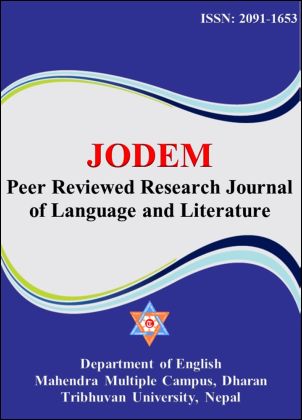Exploring the Subject of Hindu Widowhood in Koirala and Shah’s Short Stories
DOI:
https://doi.org/10.3126/jodem.v13i1.47464Keywords:
Culture, Hindu society, humanity, patriarchy, widowAbstract
Nepali Hindu widows have been discriminated in social, cultural and religious activities that have affected the psyche of the widows. People debilitate widows and consider them vulnerable and insecure. The research paper has explored the portrayal of Nepali Hindu widows’ conditions in B. P. Koirala’s “To the Lowlands” and Prem Shah’s “A Husband” from the viewpoint of new criticism. The conflicts, tensions, symbols and meanings of the lives of the Hindu widows portrayed in the selected texts are analysed from a new critic’s perspective. The study has exploited exploratory qualitative method. Koirala has portrayed a Hindu widow who left the house because of abuses by her brother-in-law and tortured by in-laws. She moved to the plain (tarai) with four men including Gore for happy life. But Gore stole the widow’s gold and money despite her marriage proposal. Shah portrayed a widow Nirmala who was teased and abused by a driver and her sister’s probable husband. She wants to make up her face, but she was frightened with her elder brother, sister and mother because of restrictions imposed upon Hindu widows. Koirala and Shah have depicted miserable widowhood in the Nepali Hindu society. Although sati tradition has been abolished and remarriage of widows are encouraged in the present time, widows are psychologically shattered because of Hindu socio-cultural viewpoints on them, and Hindu widows still sacrifice their lives through psychological sati in Nepali society. The analysis of widowhood in the stories contributes to understanding the condition of widows in Hindu society.
Downloads
Downloads
Published
How to Cite
Issue
Section
License
© Department of English, Mahendra Multiple Campus, Dharan, Nepal

